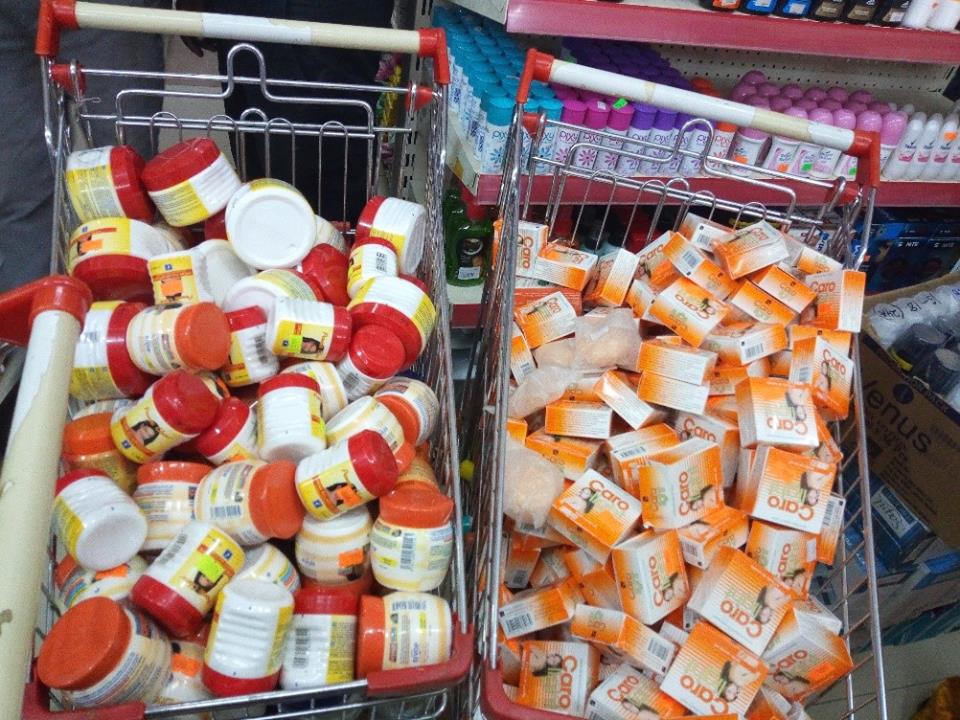
KAMPALA – As we (humans) desire to look good, we get the urge to artificially enhance our appearances to get rid of pimples, spots, rashes, uneven tone, blackheads and dark skin to mention but a few.
Often times, this urge leaves one looking around for cosmetics that will deliver results fastest.
Cosmetics are mixtures of chemical compounds derived from natural (such as coconut oil), synthetic or artificial sources.
Cosmetics applied to the face include lipstick, mascara, eye shadow, foundation, blush and bronzer and those applied to other body parts include skin cleansers, soaps, body lotions, shampoo and conditioner, hair styling products (gel, hair spray, etc.), perfume and cologne.
But as you go shopping for these products, do you take off time to read the product’s instructions for use?
For example; how and when to apply the lotion, the manufacture and expiry date and most importantly product ingredients that you’re told will deliver results in the shortest possible time.
There is value in knowing about the hazards of these chemicals. Even if you never experience an adverse reaction, consumers have the right to know what is in the products they use.
Without this information, the consumer is unable to make an informed decision about continuing the use of products with toxic ingredients.
Manufacture, importation and sale of cosmetics that contain mercury and hydroquinone was banned by UNBS.
This is because hydroquinone, as established by research, is a carcinogenic or a cancer-causing chemical (yamaguchi et al, 1989) and is also linked to Ochronosis, a medical condition in which the skin becomes dark and thick;
Some of the dangers associated with hydroquinone include:
1. Cytotoxic effects that kill body cells on the skin pigment.
2. It destroys body cells, which may result into cancer.
3. It metabolizes to quinine that causes eye irritation leading to red-eye and open sores of the central eye, eventually causing blindness.
4. It thins out the outer layer of the skin causing loss of its elasticity which is dangerous especially during post-surgical procedures as it takes a longer time for the skin to heal from cuts, wounds, and stitches.
5. People who bleach especially women AGE FAST.
6. Hydroquinone compounds have an awful smell and cause intense body heat and sweating. Users often try to cover up the smell by excessive use of perfumes which worsens the situation.
7. People who use these cosmetic products have to stay constantly in air-conditioned rooms because their bleached skins cannot resist Ultraviolet rays from the sun.
On the other hand, Mercury, according to studies, is a “toxic heavy metal” that can lead to rashes, skin discoloration and blotching;
1. Long-term exposure to high levels of mercury can cause damage to the kidneys and liver.
2. Chronic use reduces the skin’s normal resistance against bacterial and fungal infections.
3. Other effects include anxiety, depression, psychosis, and peripheral neuropathy
4. Mercury is toxic to the nervous system. Use of soaps containing mercury causes toxicity in the nervous system leading to shakiness, laziness, tiredness and dizziness, loss of memory and generalized aches and pains.
5. Mercury in cosmetics affects the environment (water bodies) in the form of wastewater.
6. A pregnant mother who uses such cosmetics is at risk of damaging the developing fetus.
To protect Ugandans against such hazardous products, government through Uganda National Bureau of Standards (UNBS) effected the ban on cosmetics containing hydroquinone and mercury in 2016. This was after UNBS tested some cosmetics and findings revealed that they were containing mercury exceeding the level permitted by UNBS standards (US EAS 377-1:2013) while others contained potent ingredients like hydroquinone.
UNBS also developed a number of national standards to govern the cosmetics industry which can be found at webstore.unbs.go.ug or at the UNBS Information Resources Center at the UNBS Headquarters in Bweyogerere.
Below are some of the CONSUMER TIPS that can be followed while buying cosmetics;
1. Check for ingredients to avoid buying products that may contain ingredients you are allergic to.
2. Stop buying and using creams and lotions that that contain hydroquinone and mercury for the good of your health.
3. Look out for the packaging of the product; it should be intact and well-sealed.
4. Check out for the Expiry date, don’t buy a product whose expiry date has passed, you can’t guarantee the safety of such a product. Both the manufacturing date and best-before date should be visibly displayed on the package.
5. The Physical address and contacts of the manufacturer should be displayed on the packaging of the product. Don’t buy any product whose manufacturer is not mentioned on the product package.
6. Avoid buying goods from ungazzetted areas, it is hard to trace the seller in case of a complaint. Buy from established outlets and demand for a receipt.
7. Avoid shopping in dark hours of the night from hawkers. It’s in the night that substandard goods hit the market because it’s dark and everybody wants to get back home fast.
8. Always report any distributor or dealer of expired products to the nearest police station and contact UNBS for redress on Toll-free Number; 0800133133.
You can also check an article on blackheads here” and at the text “here”




